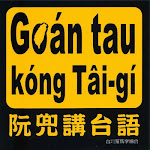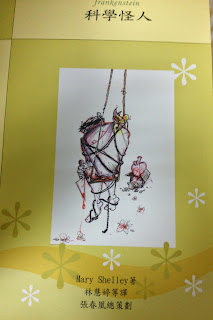http://www.tailingua.com/resources/computing/input.php
Recommended:http://taigi.fhl.net/TaigiIME/
Friday, December 19, 2014
Wednesday, December 10, 2014
Sèng-tàn Cheh ê Koa : Pêng-an Mî
Pêng-an mî! Sèng-tàn mî!
平安 冥,聖誕 冥
真 安靜 真 光明。
光 照 老母 照 嬰孩,
真 溫純 又 真 可愛。
上帝 賜 安眠,
上帝 賜 安眠。
Pêng-an mî! Sèng-tàn mî!
平安 冥﹗聖誕 冥!
眾 牧者 大 驚惶
忽然 天頂 光映映
天軍 唱 哈利路亞。
今冥 主 降生
今冥 主 降生
Pêng-an mî! Sèng-tàn mî!
平安 冥﹗聖誕 冥!
聖 嬰兒 美 無 比
面貌 榮光 照 四方
救贖 恩典 極 齊全。
主 耶穌 降生
主 耶穌 降生
Thursday, October 2, 2014
Heidelberg Catechism Question 1 in Taiwanese
Tuesday, August 26, 2014
Thursday, August 21, 2014
Language Degradation: Culprit -- Mandarin-only Teaching in Schools
Taipei Times: August 21, 2014
Minister laments decline of languages
CULTURAL CONCERN:A survey on the prevalence of Aboriginal languages in Taiwan showed that only a small proportion of younger people are still speaking them
By Loa Iok-sin / Staff reporter
Citing the results of a survey on the use of Aboriginal languages, Council of Indigenous Peoples Minister Mayaw Dongi, an Amis, voiced his concern about their decline, calling on Aborigines across the country to put more effort into reviving their languages, warning that ethnic groups would vanish soon after their language disappears. “The language is a decisive element in whether Aboriginal cultures prevail; when a language becomes history, the tribe will soon become history as well,” Mayaw told a press conference, at which the council released the results of the survey that lasted almost a year and interviewed more than 120,000 Aborigines. “It must be remembered that a language can only be preserved by that language’s speakers, no matter how much concern and help others offer. It’s the speakers’ responsibility to save the language,” he said.
Mayaw said he was concerned because the second phase of the nationwide survey on the Saisiyat, Sakizaya, Tao, Bunun, Amis and Puyuma languages — and 17 dialects of those languages — showed that, on average, 89 percent of the respondents speak Mandarin at home and that only 52.7 percent said they speak their Aboriginal language from time to time in their daily lives.
Council of Indigenous Peoples Department of Education and Culture Director Maljeveljev Tudjlimaw said that among the six Aboriginal languages surveyed, Puyuma would be added to the endangered languages list, as only 27 percent of respondents said they spoke the Puyuma language regularly, while 94 percent said they spoke Mandarin during their daily lives and 46 percent Hoklo (commonly known as Taiwanese).
“Taking a further look at the figures, we can see that there is different language use among different age groups. Those who are 41 years old or above — especially those who are over 60 years old — speak their Aboriginal language better, while the 31-to-41 age group speak it not as well. The ability to speak their Aboriginal language is most worrying for those under 30,” Maljeveljev said. “Among the six languages, the ability to use the Aboriginal language is the worst for Puyumas.”
She said that there are also differences in each of the languages among Aborigines living in traditional Aboriginal lands and those who live in cities.
“Apparently, those living in traditional Aboriginal villages speak their languages better, while those living away do not speak as well,” she said. “However, it must be noted that, whether living in Aboriginal villages or away, the Puyumas are not doing as well speaking or passing down their language.”
On the other hand, Mayaw said there is also good news, as after three years of a language revival project there has been much progress in the language abilities of the Kavalans, Sakizayas and Saisiyats.
“The tribal language ability of these three Aboriginal groups, in general, has progressed well and has even surpassed some other groups,” he said. Previously, the three languages had been listed as “endangered” along with six other Aboriginal languages — Thao, Kanakanavu, Laa’rua and three dialects of Rukai.
“The purpose of the language survey is to identify the endangered languages, so that we may come up with a project to help revive those languages and to monitor the progress of the revival of the language,” the minister said.
Read more...
Saturday, May 10, 2014
Resurgence of Suppressed Languages in Europe
Skip ahead to minute 18 regarding language extinction and language diversity.
Monday, April 21, 2014
Monday, April 14, 2014
New Taiwanese Translations of Literary Classics
Sunday, April 13, 2014
Thursday, March 20, 2014
Monday, March 3, 2014
N̂g-kim Siang Káng, Hēng-hok Hái-kîⁿ [ 黃金雙港 幸福海墘 ] - 張逸嫻 Tiuⁿ La̍t-hân
張逸嫻 Tiunn Ia̍t-hân
Wednesday, February 12, 2014
Yok-hon Fuk-Yîm 3:16
Yok-hon Fuk-Yîm 3:16
Yîn-vi Song-ti thung-siak sṳ-kiên-ngìn, só-yî chiông Kì ke Thu̍k-sên-chṳ́ su pûn kì-têu, oi pûn yit-chhiet sin kì ke ngìn m̀ voi me̍t-mòng, fán-chón tet-tó yún-yén ke sâng-miang.
https://archive.org/details/HakkaIokhan316
---------------------------------------------
Another translation:
Yîn-vi Song-ti án-ngiòng oi sṳ-kie, só-yî tsiông Kì tshṳ-kâ ke Thu̍k-sên-tsii2 loi3 su-pûn kì-têu, sṳ́-tó sin-kho Kì ke ngìn m̀-voi me̍t-mòng,fán-tsón tet yún-sên.
Hàu-kèng Pē-bú (On Filial Piety)














